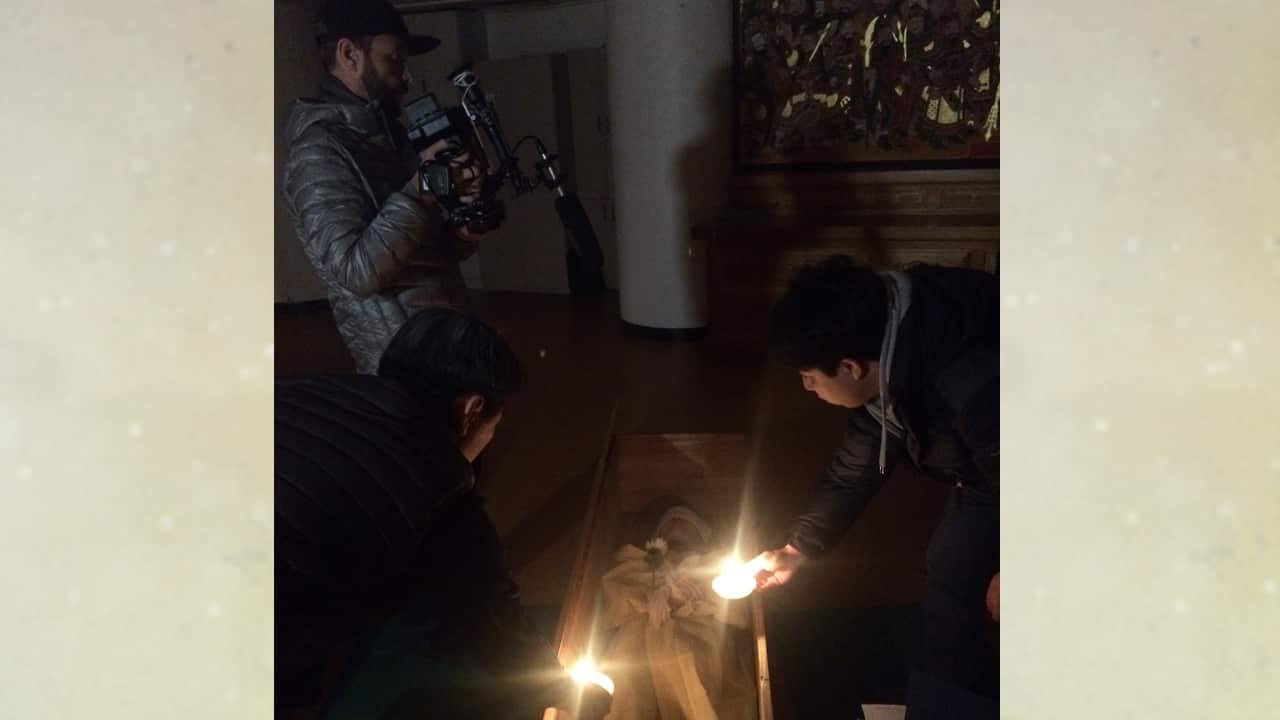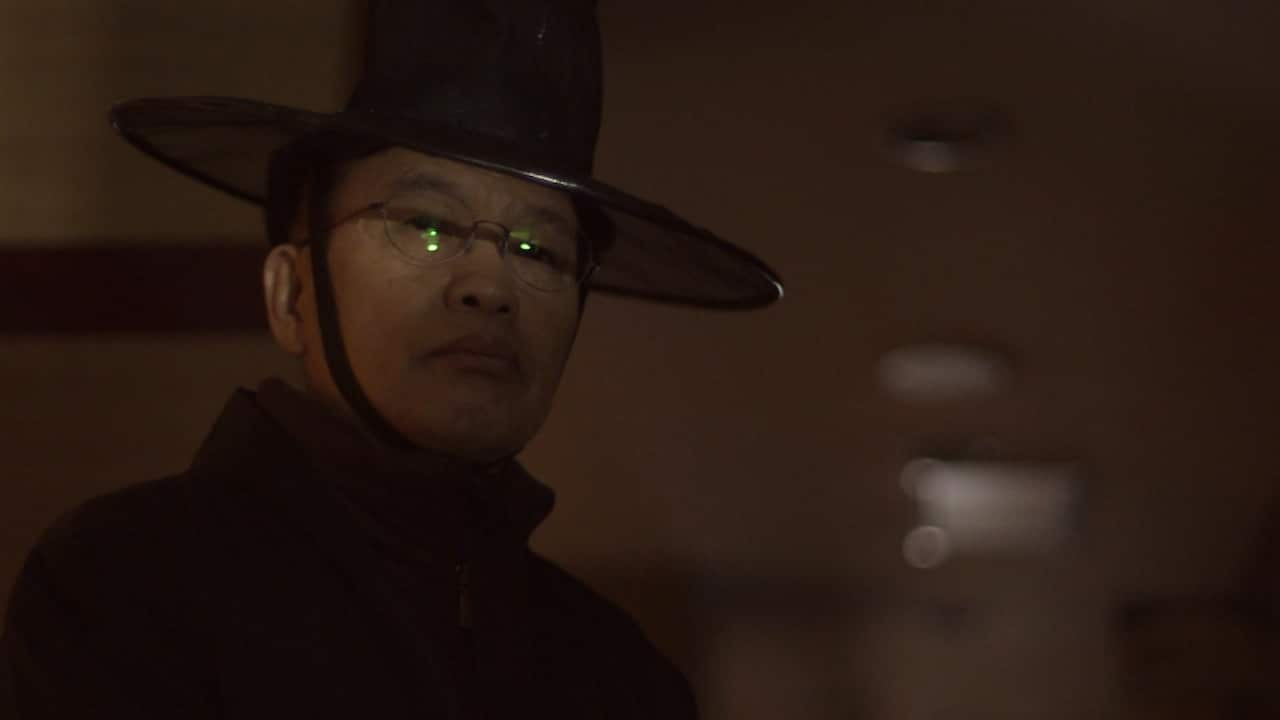At 1pm, seven people will gather in a classroom and write their suicide notes. They’ll then move through a forest to a grand hall, where they’ll lie in coffins. They will have their hands and feet tied, and I’ll be watching every aspect of this fake funeral.
I have some anxiety about making this film, which is ironic, because it’s a film about people who have anxiety and depression. People who have considered or attempted suicide. People who are looking for an answer.
Travelling in a car through the frozen city of Seoul, I think about a concept I assume most documentary makers have grappled with at some stage: introducing a camera into any situation irrevocably changes its nature - no matter how good or subtle you are.
The participants of the fake funeral are here to meditate and release their feelings. That can be hard with a camera in the room. Someone watching and listening, as you cry and talk about your deepest fears.
But an hour into the four-hour experience, they seem to have forgotten I’m here – they’re completely caught up in the harsh realities of death. They’re confronting them, and going through a highly emotional release.
I tip toe around the room and hide in the corner nonetheless.
In the days leading up to the fake funeral I’ve had a glimpse of Seoul’s high pressure lifestyle. Long work hours and the pressure to be ‘number one’ lead to intense competition.
It’s an idea so pervasive, it even has a name here in South Korea: they call it ‘bali bali’ which literally means ‘faster faster’.
This city is home to over half of the people in South Korea. It is one of the largest metropolitan economies in the world - and it’s growing.
That rapid growth is being blamed for South Korea’s suicide rate, which is the highest in the OECD. A rocket strapped to the back of this once pastoral peninsula, which functions as an island, cut off by the North.
The people are isolated too. They’re islands. That’s why seven Seoul residents are going to the fake funeral today.
South Korea may have very high suicide rates, but it’s also a world-topper in other unenviable areas. Alcohol consumption, plastic surgery and internet addiction. I’m realising the other Dateline piece I’m filming here, Korea’s Internet Addicts, has its roots in loneliness and escapism as well.
Of course, this condition isn’t unique to South Korea. The more I hear the brave participants in the fake funeral speak about their experiences, the more I realise there’s a little ‘bali bali’ in all of us - and I think of plenty of non-Korean people I know that could benefit from this kind of experience.
I thought the fake funeral would be all about fear and mourning. But as the four-hour process continues, I realise it’s largely about life-affirmation. Which makes sense.
Kim Ki Ho, the creator and leader of the program, tells me it’s a ‘death meditation’. For starters, he takes participants to the edge of death via the most eclectic multimedia presentation I’ve ever seen.
Images from Titanic, the Asian Tsunami, Steve Jobs’ speeches and a fly-on-the wall Korean documentary about a man dying from cancer are played on a projector screen.

The overall message is ‘life is short’, ‘people die in ways that they don’t choose’ and ‘when you’re gone, you’re gone’.
It’s an interesting tack and I find myself surprisingly moved by the randomly collected snippets.
It works for the participants - tears flow as they have their graveside photographs printed, and they dig deep into their personal demons as they pen the final sentences of their suicide letters.
Kim Ki Ho tells me that no one really talks about death in Korea - there aren’t even any cemeteries in town. Death is hidden away and avoided, a taboo subject.
He insists it’s healthy to talk about death as a normal part of life, and that confronting death helps people find their direction in life… right now though, the participants seem traumatised.

A figure from Korean mythology, the Angel of Death, appears and things get stranger. I can’t describe the energy shift that happens when highly emotional people are placed into coffins and all of a sudden I’m in a room by myself with just a bunch of coffins.
It’s utterly bizarre, but for those participating, eventually, it feels like absolute release.
I leave not knowing whether fake funerals could be the answer for stressed-out South Korea. For these people it’s allowed an afternoon away from ‘bali bali’ madness, and time to reflect - even if they had to go inside a coffin to find it.
See Dean's story, Korea's Fake Funerals, in full
Support and Advice
If you’re affected by this story and would like to speak to a professional now for support and advice, phone one of these 24 hour helplines:
- Lifeline: 13 11 14
- Suicide Call Back Service: 1300 659 467
- BeyondBlue: 1300 22 4636
- MensLine Australia: 1300 78 99 78
- Kids Helpline: 1800 55 1800
Dateline is an award-winning Australian, international documentary series airing for over 40 years. Each week Dateline scours the globe to bring you a world of daring stories. Read more about Dateline
Have a story or comment? Contact Us


